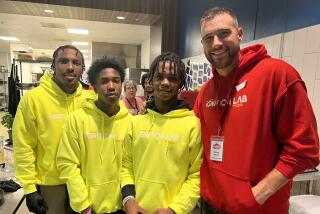Refusing to Submit to a ‘Shell’ of a Body
- Share via
David Curtis is set to seek his place in the world, equipped with a National Merit Scholarship, a perfect grade-point average in high school, awards, honors and a body that he calls “an undesirable shell.”
“Everyone has limitations. Some are more pronounced than others,” Curtis told a roomful of civic leaders last week when the Academic Achievement Award of the Pasadena Mayor’s Committee for Employment of the Disabled was placed in his lap.
It was the latest in a string of public acknowledgements that Curtis is an exceptional person. He handled it with what friends say is his customary aplomb, maneuvering his wheelchair to the podium, speaking into the chair’s built-in sound system that amplifies his frail voice, and telling people just how it is.
Definition of Disabled
“Disabled people are normal people with unusual limitations,” the 18-year-old said. “I am a normal person trapped in an undesirable shell.”
A victim of spinal muscular atrophy from birth, Curtis could not hold his latest plaque. He is barely able to lift the microphone that he usually speaks into. His head rests in a brace. He has been in a wheelchair all his life, has had a tracheotomy to enable him to breathe, and requires the help of a respirator at night. There is no known cure for his condition, which is a progressive degenerative disease of the motor cells of the spinal cord.
Yet Curtis graduated in June at the top of his Pasadena High School class and was accepted at Pomona College, where he plans to enroll in January. His list of high school activities and awards seems endless and includes being editor-in-chief of the school’s literary magazine, opinion editor of its monthly newspaper and a member of the Science, Physics and Chess clubs, homecoming court selection committee and prom committee.
He even lettered as statistician of the varsity football team for three years.
“You could see this remarkable chair of his zipping up and down the sidelines,” said Edmund Sutro, a Pasadena High School social studies teacher who was one of Curtis’s mentors. “And he zipped through those classes with that marvelous brain of his.
“The most unusual aspect of him that surprises you is an insight, which you just wouldn’t expect from someone whose world is so confined,” Sutro said. “He is so profound, and how he’s acquired that, I couldn’t tell you.”
Bruce Poch, dean of admissions at Pomona College, said: “He has a tremendous mind, and he struck me as someone with great perspective, humor and interest in stretching his mind. He will be able to take advantage of our curriculum and other students will benefit from him and the way he synthesizes ideas. That’s fundamentally what we’re looking for anyway.”
Curtis is taking a respite between graduating in June and entering Pomona College as a commuting student. He is awaiting a new wheelchair with improvements, “and frankly, I’m a little burned out,” he said.
Meanwhile, Poch said, Pomona College is making way for Curtis.
“We will move classes to accommodate David,” Poch said. “If he wants to hear a speaker in a room he can’t get into, we’ll even move the speaker. But it’s not going to be 100% easy for him, and it’s going to be a learning experience for us.”
Curtis, whose parents, Len and Jackie Curtis, live near Eaton Canyon, does most of his school work on a computer, with the keyboard resting on his lap. He has props for books, but always needs help with turning pages. He dictates some of his work to an aide. His mother drives him in a specially outfitted van and helps with every aspect of his life.
Sutro said Curtis was allowed to take home writing assignments usually done during class because he could not bring his computer to school. But that was the only exception that was made for him.
Sounding like a happy teen-ager, he said, “I never thought of things being bad or overwhelming. I thought of myself as normal, and so when something interested me I thought--well, I can be doing that. It was my desire to be a part of the school, student body and classes that drove me to participate without letup, to try to excel. Then I saw what I had done, and would keep it up.
“Everything physical is difficult and slow,” Curtis said during an interview in his home. “Even eating takes a long time.”
He reads science fiction, he said, “because when it’s done right it asks ‘what if?’ and it doesn’t take anything for granted. It asks important questions and makes you think.”
‘Hopeless Football Nut’
His bedroom is decorated with football posters and he said, “I’m a hopeless football nut. Basically I’m a Rams fan, but I make it my business to know their opponents.”
His successes, Curtis said, are the result of insisting on attending regular classes after being in the Pasadena schools’ special education program at the Roosevelt School until the sixth grade.
“When I first became truly mainstreamed, in junior high school, I could see how my peers were operating and that was a catalyst for me to push myself, because I wanted that same level of activity that everyone else had,” Curtis said. “Mainstreaming was a driving force. I’m one of those people who functions on adrenalin. I’m at my best when I feel motivated--when I have a goal in front of me.”
While Sutro said Curtis had “an amazing effect” on students at Pasadena High, Curtis insisted, “they had an amazing effect on me. I won acceptance with great ease and more speed than I expected. I had a lot of relationships that were really on a normal basis. I could not have done so well without that support.
“All the book learning in the world isn’t going to help you if you don’t learn to apply it in the real world. You’ll never be able to do that if you don’t have experience with how things work in that outside world.”
Jackie Curtis said she and her husband have no special training or techniques for rearing their only child. “But you have to make a commitment and rely on your values of integrity, self-respect and caring for others. We tried to instill those things in David,” she said.
‘Glint in His Eye’
Sutro called Curtis “a genuinely popular young man. But he was not a good little boy--he was more of a teen-ager. He had that glint in his eye, which you like to see in a teen-ager.”
Sutro said that when Curtis received his diploma at graduation, he received a standing, shouting ovation from classmates. When he attended the homecoming dance in his senior year, people were happy to see him “because he’s one of them.”
“This had nothing to do with pity,” Sutro said. “It had everything to do with being an important part of the class.
Recalling his first meeting with Curtis, Sutro said “he looked so vulnerable. But he whirled that wheelchair, tilted back and looked up at me and said, ‘You’ll get used to it.’ And he was right. People got used to him very quickly.
“I think he’s a model of dealing with adversity. Taking what would be a devastating disaster and turning it into success--I think that’s what touches everybody. He’s gone farther than anyone expected, and I’m going to assume that he has a long life.”
Curtis talked openly about his disease.
“It is progressive, but very slow,” he said. “They can’t cure it, but as I get older and weaker, technology gets better. Five years from now I may be worse, but I’ll have better technological support.”
Jackie Curtis said: “David will never have the independence others have, but to feel that he has some and to exercise it--that makes it all worthwhile. To see him go out and find his place in the world--he has this sense of what is realistic.”
Turning up the volume on his speaker, Curtis blared with teen-age clarity:
“I’m realistic, except I want what I want.”
More to Read
Sign up for our Book Club newsletter
Get the latest news, events and more from the Los Angeles Times Book Club, and help us get L.A. reading and talking.
You may occasionally receive promotional content from the Los Angeles Times.










